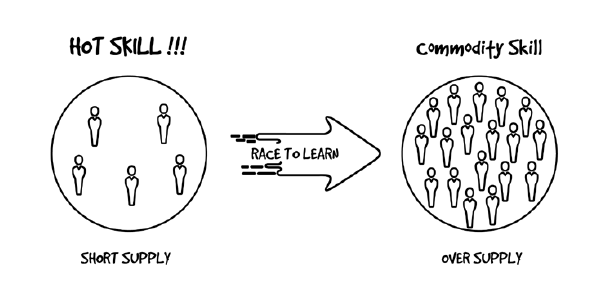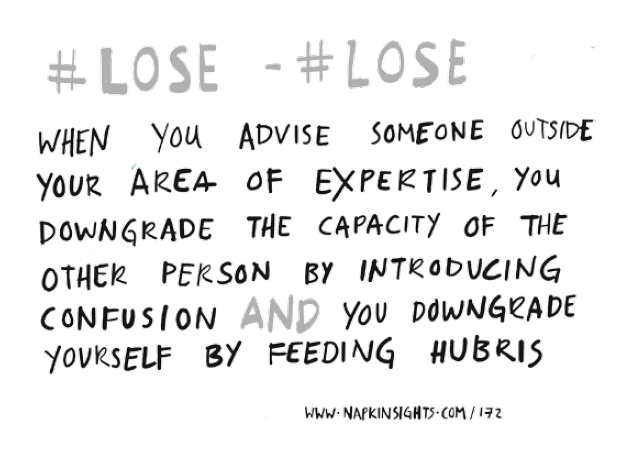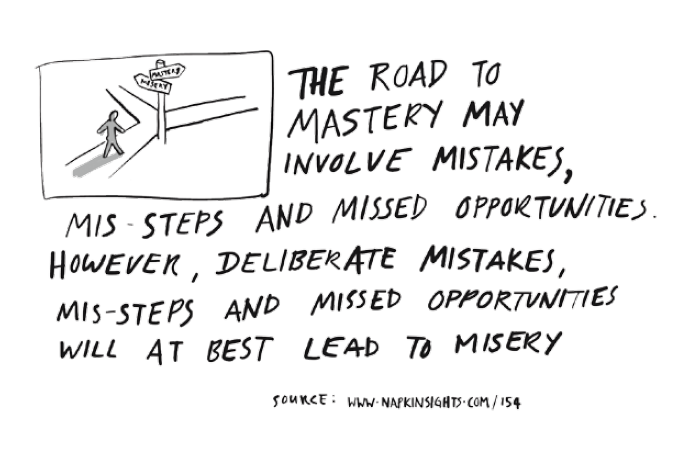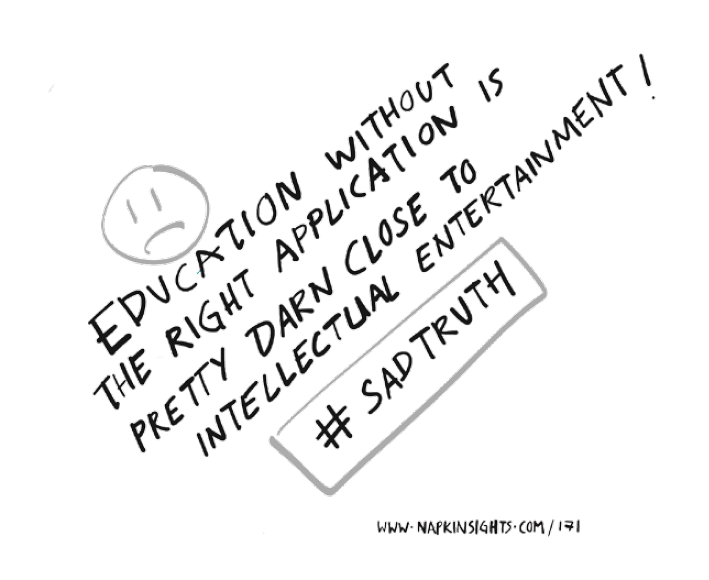<< Previous Next >>
The marketplace is hungry
The Need:
Personal Branding is No Longer a Luxury
Knowledge workers are always busy. Some people study the current hot skills, so that they can be in-demand and earn top dollars in the marketplace. However, the people who already possess these hot skills are already busy searching for the future hot skills. This technology skill set rat-race happens because today’s hot skills will rapidly become commoditized and even irrelevant. The fundamental characteristic of this technology rat- race is that it consumes all the time available to a knowledge worker.
Unfortunately, all the participants (including the winners) will lose in the long run, unless they develop other critical, non-technical skills.
The marketplace, however, looks at a knowledge worker’s technical expertise as an “entry ticket” to the game. It’s a given. Just as a cook is supposed to have good culinary skills, an architect should know how to design a building, a knowledge worker MUST have expertise in a set of technologies.
However, a personal brand can set them apart from the crowd.
A few years ago, only people who aspired to become celebrities thought about issues of “personal branding.” Today things are different. Globalization has eliminated geographic boundaries – bringing competition to knowledge workers from across the globe.
Personal branding is no longer a luxury. It is now a critical skill for their careers.
The Pain:
Commoditization Erodes Value
A commodity in simple terms is something that is available in plenty. Several skills required in the knowledge world that are hot today (simply because there is more demand than supply) are a commodity tomorrow (simply because supply exceeds the demand).
Of course, there are skills that are “lifetime skills” like relationship building. You need to race to learn them as quickly as possible. However, those lifetime skills typically won’t produce short-term results. So most people are not in a hurry to chase them.
A large majority of knowledge workers who lose in the “boxing game” are also typically the victims of commoditization. When you join the commodity crowd, your value quickly erodes. Employers and clients will not want to pay premium rates for common skills.
It will take you a few years to develop an expertise in a particular skill set. If those skills are really in-demand, then you will experience an uptick for some period of time, until others learn the skills. At some point in time, things will quickly change. The marketplace becomes flooded by people with the same skill. This oversupply erodes everyone’s value.
If you’re a knowledge worker experiencing this oversupply, you’re going to feel pain. You’ll find yourself working harder just to win and retain clients. At this point, you have three options:
- Deny: Ignore reality and continue to live in a fantasy world.
- Defy: Build deeper expertise in the same skill set.
- Flee: Look for newer and greener pastures.
In the first case (deny), you will only deceive yourself. You can’t fool the entire marketplace.
In the second case (defy), you will try to become the premiere expert in your subject. However, as soon as people realize your new mastery allows you to command premium rates, they will follow your lead. You will repeat the cycle all over again.
In the third case (flee), you’re committing yourself to starting the technology skills rat race anew. You’ll have to start again from the beginning.
Please understand that I am not against building your knowledge and expertise in technology areas. Without competence in certain domains, you are not even in the game. However, if you want to thrive in the marketplace for the long-term, you will need more than just technological skills.
The Pleasure:
Personal Branding Earns a Premium
If commoditization erodes value, then the opposite is also true. Personal branding establishes premium value. Because building a personal brand takes a long while, very few people engage in this exercise. Currently, it remains the road less-traveled. So, if you start on this journey, you will be in the minority and also in the company of the most savvy knowledge workers.
Here are four of the major benefits of a powerful personal brand:
#1 Higher value
Strong brands are always associated with greater value. Think back to the opening story about Jack and Janet. Janet’s customer called her a “Senior Peace-of- Mind Consultant” because she handled the project so well that he could sleep with peace-of- mind at night, and the project’s success even led to his promotion.
In the client’s mind, there may be many skilled technology consultants, but there will only be one Janet. This uniqueness will allow Janet to command premium rates.
There are many examples for this in the corporate world.
As a side note, think of Badge Engineering (rebadging of one product, especially cars as another) in the automotive world.
Did you know that Chevrolet Trailblazer is also marketed as GMC Envoy, Oldsmobile Bravada (until 2004), Saab 9-7X, Buick Rainier (until 2007) and Isuzu Ascender? The same car had different price points based on under what brand it was marketed.
[Source: Wikipedia article on Badge Engineering]
You can see lots of examples. Take a drug marketed under a big brand compared to a drug marketed as a generic drug or a cup of coffee sold at a local store versus a cup of coffee sold at Starbucks.
Good brands command a premium.
It is no different for personal brands. Invest in your personal brand and watch your premiums in the marketplace rise.
#2 Lower Cost of Sale
We all have something to sell to others. Many knowledge workers think they are not salespeople, but every time you try to persuade someone you’re engaged in the sales process. Your offering may be as simple as an idea or as complex as a long-term engagement.
If you have a strong personal brand, you will find it easier to convince others.
When Janet’s client has another project, who will he contact for help? He could interview dozens of IT professionals, and then he could spend late nights reviewing proposals and bids. However, he could just reach out to Janet and ask for help. Janet’s success in past projects mean that her clients will tell her about new projects. Even if she has to bid on a project, she’s going to be one of the first ones to hear about the opportunity.
#3 Automatic Market Expansion
Establish a brand powerful enough and you will put the automatic “word of mouth marketing” into motion. People love to talk about what is unique and memorable. If your brand is out of the world, you will be talked about behind you (in a good way) – spreading your message and your brand in ways that you never imagined before. It’s almost like having a 24×7 sales force promoting you.
#4 Implied Assurance
Brands usually have an advantage in terms of customer satisfaction, as there is an implied level of trust on the quality of the deliverables.
Janet’s clients know that she will do whatever it takes to make sure that each project’s go-live occurs smoothly. She anticipates problems and prevents unwelcome surprises. Janet’s reputation spreads because her clients tell their friends and colleagues about her.
The Choice:
To Put it On Your Agenda or NOT…
If you want to develop your personal brand, you should first begin with some planning and strategic thought. Half-hearted efforts in personal branding will yield, at best, mediocre results. Your first step will be to put your personal brand on your agenda.
Everything starts with an idea. You must first accept that this personal branding effort will be useful for you in the long run. That means you will need to think beyond just today and tomorrow. When you build a personal brand, you need to focus on longer time horizons. What reputation do you want to develop in five years, ten years, or even your entire lifetime? This long-term mindset allows you to invest the time and effort you will need to build your personal brand.
When you put your personal brand onto your agenda, you will be taking the first step on a long road. Some people never take this first step, and other people who begin this process soon discover that the project requires both significant time and effort. So, before we explore personal branding strategies, let’s look carefully at some of the reasons why people neglect their personal brands.
Remember that choosing not to invest in your personal brand is the same as making a choice to live with a generic brand.
We invest a lot in our education to ensure that we have a shot at interesting opportunities and growth. Investing in developing a personal brand is similar but more intense. Unlike college, it is the marketplace that grades you on your personal brand.
<< Previous Next >>




